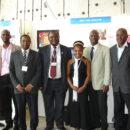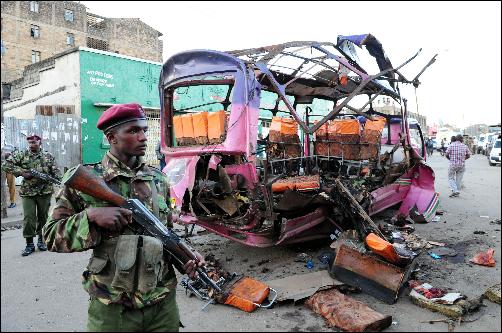Africa Insiders: Is Abiy Ahmed’s Nobel Peace Prize premature?


H.E. Prime Minister Abiy Ahmed at the African Union. Credit: Office of the Prime Minister – Ethiopia
The essentials: Ethiopian Prime Minister Abiy Ahmed was awarded the Nobel Peace Prize, the world’s most prestigious award for those who have “done the most or the best work for fraternity between nations, for the abolition or reduction of standing armies and for the holding and promotion of peace congresses.”
The context: Abiy Ahmed, assumed the office of Prime Minister, Ethiopia‘s most powerful political job, in April 2018. At that point, the country had experienced months of widespread unrest and protests with thousands of people hurt or killed. At the core of the tensions was the critique of Ethiopia’s largest ethnic groups, the Oromo and Amhara, of the dominance of Tigray people in the country’s politics, economy and military.
Ahmed, son of an Oromo father and an Amhara mother, member of the ruling party and former intelligence officer, quickly embarked on a rapid program of domestic and foreign policy reform. He freed thousands of political prisoners and broadened the space for public debate, resulting in a jump of 40 places in the Press Freedom Index. After meeting several times with representatives of Eritrea, Ahmed and his Eritrean counterpart President Afwerki formally ended the state of war between the two countries, which had lasted since the outbreak of a border conflict in 1998. Ahmed’s administration also reestablished some economic and communication links with Eritrea, leading to the reunion of thousands of people after decades of isolation.
In awarding the Nobel Peace Prize to Ahmed, the committee has also continued to focus on African peacemakers: Including Ahmed, five of the last 15 laureates are African. Ahmed joins Congolese gynecologist Denis Mukwege (2018), the Tunisian National Dialogue Quartet (2015) and the Liberian peace activists and politicians Ellen Johnson Sirleaf and Leymah Gbowee (2011).
The good: Ahmed is certainly a hopeful figure on a continent where recently heads of state and government have concentrated more on extending their constitutional term limits, instead of announcing bold political reforms. Together with other initiatives like the Ibrahim Prize for Achievement in African Leadership, high profile awards like this might indeed shape the culture of leadership across Africa to a certain extent.
The bad: Ahmed’s award unfortunately also showcases another tendency of the Nobel Prize committee: doling out premature praise. While Ahmed’s political vigour and rhetoric have been impressive, he has only been in power for a good year and most of his initiatives have not had time to demonstrate longevity yet. Peace with Eritrea is tenuous and the dialogue between the leadership of both countries has died down in recent months. While the state of war has ended, much of the announced and expected economic peace dividend has yet to materialize, because the land borders remain closed.
Abiy’s domestic reforms are certainly welcome, but Ethiopia has also experienced high levels of ethnic conflict in the southern part of the country under his watch. And if he is indeed ready to face a democratic process will only be proven next year, when Ethiopia will vote for a new parliament.
The verdict: One can not escape the feeling that the prize committee would have done both itself and Ahmed a favor by waiting for another few years before considering him. By awarding him the Nobel Peace Prize now, before Ahmed’s reforms have had a chance to fully bear fruit, the committee has put a lot of pressure on Ahmed, who does not have complete control over the success of his domestic and foreign agendas. And while we remain hopeful of Ahmed’s intentions and probability of success in reshaping Ethiopia’s political landscape, he wouldn’t be the first reformer to be overcome by his ambitions.
- Announcement of the Nobel Peace Prize committee
- Audio: Abiy Ahmed’s first reaction (Nobel Prize)
- Why I nominated Abiy Ahmed for the Nobel Peace Prize (Al Jazeera)
- Nobel Peace Prize: Ethiopia PM Abiy Ahmed wins (BBC)
- Abiy’s Nobel Achievements Are Real but Brittle (Foreign Policy)
- Was the Nobel Peace Prize for Ethiopia’s prime minister premature? (Global Voices)
- Opinion: Nobel Peace Prize for Abiy Ahmed a misguided decision (DW)
Discuss with @PeterDoerrie on Twitter
Pay what you want for the FULL Africa Insiders Newsletter!
We hope you enjoyed this Free Edition of the Africa Insiders, but is only a taste of the full experience. This week, the Full Edition also covered:
- What we are talking about: Kenya Unlimited: Kipchoge, Kosgei make sporting history
- Continental health corner: A fully funded Global Fund
- Conflict focus: Another deadly attack in Burkina Faso
- Links of the week: Everything Africa-related that is worth your time and attention
To upgrade, email [email protected], telling us the price you’d like to pay.
Yes, you decide the price as long as it’s at least $2 per month to cover the transaction costs.
If you are unsure what to pay, we recommend $10, but it’s up to you and we won’t judge. If you give more ($15/month, $50/month, $100/month!), your extra donation above $10 will go into a special fund for AfricanArguments.org to commission in-depth articles by African writers and journalists that will be free to read for everyone.
Again, just email [email protected] and let us know any amount of $2 or more and you’ll get the Full Africa Insiders Newsletter for the price that feels right to YOU!
The Africa Insiders’ Newsletter is a collaboration between AfricanArguments.org and @PeterDoerrie, with contributions from @_andrew_green and @Shollytupe and assistance from Stella Nantongo. Part of the subscription revenue is funding in-depth and freely accessible reporting and analysis on African Arguments.







Should Malala Yousafzai not have received the Nobel since female education in Pakistan is still lacking?
Should Ellen Johnson Sirleaf not have been awarded since Liberia’s economy is extremely underdeveloped?
The Nobel Committee was very clear, the award is for “recognition and encouragement” of one’s efforts.